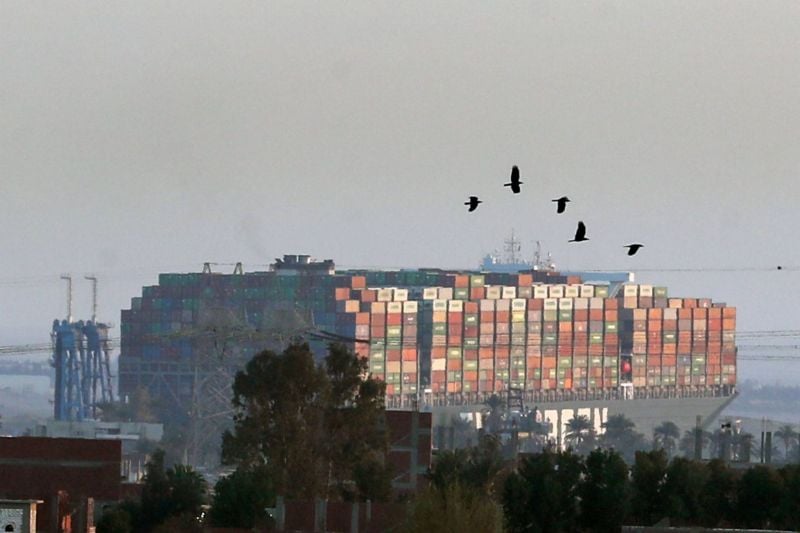
The megaship Ever Given, one of the world’s largest container ships, ran aground on Tuesday, blocking the Suez Canal and disrupting global trade. (Credit: Mohamed Abd El Ghany/Reuters)
BEIRUT — Lebanon’s fuel supply chain faces potential risks as the blockage of the Suez Canal — one of the world’s most vital maritime trade arteries — rounds out its fourth day on Friday with no end in sight.
The canal, a passageway for about 12 percent of total global trade, including crude oil, refined oil and liquefied natural gas, has been cut off since Tuesday after a 400-meter megaship called the Ever Given ran aground, blocking the passage of more than 200 vessels.
One of these ships is a Kuwaiti oil tanker carrying gas oil bound for the Zahrani power plant in southern Lebanon, one of the four major plants supplying electricity across the country.
“The ship was due to arrive today,” Marc Ayoub, an energy researcher at the Issam Fares Institute at the American University of Beirut, told L’Orient Today.
But as of Friday, the Kuwaiti tanker’s latest coordinates indicated that it was still in the vicinity of the Suez Canal.
Electricity blackouts in Lebanon have already intensified as of late, with reports suggesting a potential fuel shortage.
Representatives from the Energy Ministry and public utility Électricité du Liban could not be reached for comment about whether the tanker’s delay could further affect electricity supply.
Kuwaiti national oil company KNPC is the last national distributor supplying Lebanon with oil for electricity purposes, Ayoub said, after Algerian fuel distributor Sonatrach discontinued its contract with Électricité du Liban due to a scandal over “tainted fuel” last year.
Lebanon has failed to reach a deal with other suppliers since the contract lapsed at the end of 2020, and as a result, the state fills the rest of the country’s fuel needs through the spot market. These on-the-spot purchases are costly and require payment upfront in foreign currency.
Tankers carrying spot market shipments to Lebanon are mostly dispatched from Europe and countries around the Mediterranean, Noam Raydan, a Baghdad-based analyst focusing on energy and geopolitics in the Middle East and North Africa, told L’Orient Today.
This cargo too might be affected by the blockage.
“It depends on where their crude oil is coming from,” said Laury Haytayan, the MENA director at the Natural Resource Governance Institute.
“There will be disruptions to the global oil trade since oil tankers from Asia and Europe pass through the canal as well,” Haytayan added.
According to Ayoub, the blockage could affect other oil tankers potentially headed to Lebanon. However, this cannot be confirmed because ships typically do not announce their final destination until after they pass the canal, he added.
In any case, Lebanon’s oil and other commercial imports are bound to experience some residual delays if the blockage lasts weeks, as Peter Berdowski, the chief executive of Royal Boskalis Westminster, which was appointed by Ever Given’s owner to help unblock the vessel, on Wednesday said it might.
If the Suez Canal is clogged, ships will continue resorting to longer trade routes. According to data intelligence firm Kpler, seven tankers carrying liquefied natural gas (LNG) were already diverted as the crisis entered a fourth day. It added that three of the tankers were being diverted toward a longer route around Africa, via the Cape of Good Hope.
“This journey takes around 10 days longer and increases cost,” said Ahmad Tamer, the Tripoli port director.
"Arrivals at the port of Beirut will be slowed down, but not to the point of endangering the country’s commercial activity,” Ziad Kanaan, the general manager of the Beirut Container Terminal Consortium at the Beirut port, told our sister publication Le Commerce du Levant.
Also speaking with Le Commerce du Levant, Maroun Chammas, the managing director of petroleum company Medco and the president of oil company Phenicia, maintained that the incident would not significantly impact Lebanon’s fuel shipments, at least, because the country “buys from the Mediterranean, Greece and neighboring countries.”
“There should therefore be no worries about gasoline,” he said.